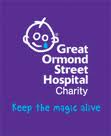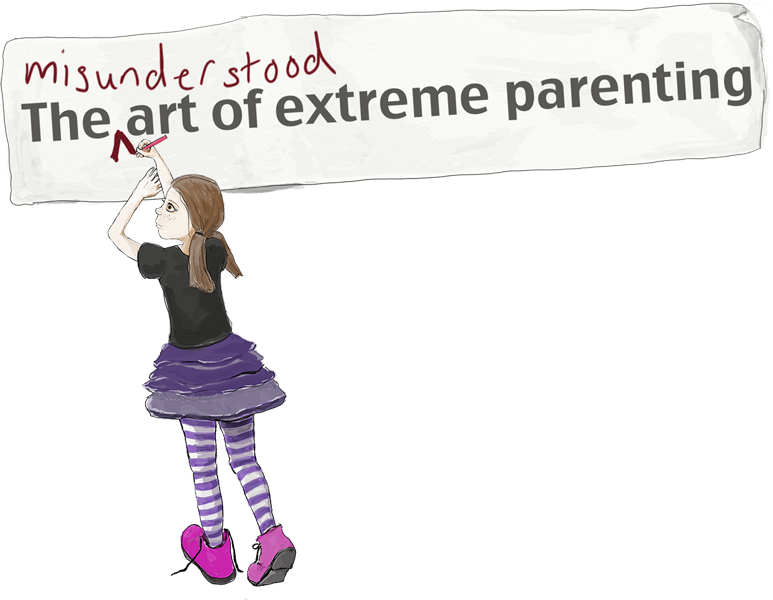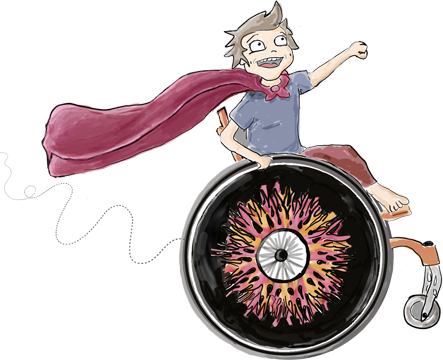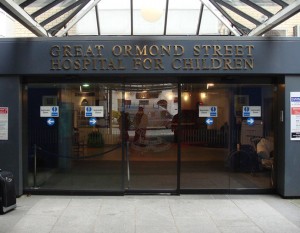The Child First and Always
The Child. First and Always
The Child First, And Always.
The Child? First and Always?
What makes a great medical institution great? Is it the doctors? Dedicated, caring, jutting of chin with a hint of the maverick about them? Perhaps it’s the nurses? Understanding, effortlessly selfless, wafting from patient to patient dispensing compassion and tireless devotion? Or is it the sick, but still oh-so-cute patients? Brave in the face of adversity, an inspiration to us all and uncomplainingly grateful to all the heroic medical team whose commitment to each and every child brings a tear to even the most stoney hearted’s eye? Or perhaps you just need a cool motto emblazoned across the front door, a catch phrase that Disney would be proud… and, of course, a few highly skilled spin doctors just for good measure?
You may declare me an old cynic who has been jaded by 8 months of institutionalisation, and I’d utterly and unobstructively agree. But you might ask yourself why, when I have lived amongst the ‘magic’ of Great Ormond street for so long, am I not tearfully posting gushing messages on GOSH’s charity Facebook page declaring the place to be amazing and the doctors to be miracle workers. Because, unfortunately, when it really counted, the hospital made a mockery of their motto and I don’t think I will ever trust the staff within it properly again. I understand that this is rather a grave thing to say, and before I am lynched by those people waving pitch forks in my general direction shouting about a child or a relative who was saved by the miracle workers in the hospital, give me a chance to explain…
I walk around the corridors of the hospital late at night sometimes, down the cold staircase of the old part of the hospital with its column of grimy netting lining the banister in a tired attempt to dissuade people from jumping when it all gets a bit much. I walk down the quiet corridors, some brightly lit, some darker than they should be, occasionally seeing a cleaner who doesn’t ever lift their head to see who is passing. I always tune into a slightly manic beeping coming from a control pad somewhere meant for the ears of a maintenance engineer who never hears it over the daytime noise of life and children and people trying to get somewhere, or get out before the small screaming child explodes and takes the parents with them. When I run out of corridors to walk I seem to inevitably end up in the main entrance. There really isn’t anywhere else to end up. The smokers, finding solidarity in their bright pink fluffy dressing gowns and cups of tea gather there too, either preparing themselves to brave to cold or warming up whilst being sociable with those they meet nightly doing the same. The security guards occasionally survey the party of people with mild disapproval before staring back down again at whatever reading material is on their desks.
The main entrance is the only real sign of life away from the beeps and crying babies on the ward at night and I rather like it there, although I never know quite what to do with myself once I arrive. I don’t want to go outside, because not only is it cold, I really have nowhere to go. I don’t smoke, not that I haven’t thought about reacquainting myself with the habit occasionally over the last few months, and I have no desire to walk up and down a wet street just for the sake of it. The last thing I see before I about turn and head back to the ward is the motto of the hospital on the door: “The Child First and Always”.
I’ve chewed this phrase over a fair bit since I’ve been in this hospital. Sometimes bitterly, sometimes affectionately, sometimes simply perplexed by the nonsensical phrasing. For the most part, recently, I’ve looked at that motto with sadness, looked at the pictures of grinning children, blown up to gigantic proportions bravely sporting their NG tubes reminding the patrons of the hospital to ‘keep the magic alive’ and wondered what alien place it’s referring to. Using the word magic to describe a place of science is imbuing it with a mystical quality that goes beyond the realms of what mere medicine can do. Is the whole place indeed touched with magic? Some would no doubt agree. But I, for my part, have yet to see Tinkerbell in the canteen (in between fairy duties in the rooms of the sick and desperate) pushing around some cardboa rd chips and vegetables that are doing a commendable job at clinging to some semblance of solid form on a paper plate. Or is the use of the word magic simply the glitter sprinkled liberally around to help hide the peeling paint and the children hidden away, not cute enough or curable enough to make it onto the press’ camera roll.
rd chips and vegetables that are doing a commendable job at clinging to some semblance of solid form on a paper plate. Or is the use of the word magic simply the glitter sprinkled liberally around to help hide the peeling paint and the children hidden away, not cute enough or curable enough to make it onto the press’ camera roll.
Am I honestly suggesting that a certain spin is placed on the publicity that GOSH generates? Well, yes actually, but from the charity’s point of view, it would be crazy (if in fact more honest) not to. Stories told about the amazing hospital usually involve cures, a grateful family and a slightly overly modest doctor. But trust me there are plenty of children within its walls that the doctors can’t or don’t help. Parents that leave frustrated and tearful having been given no cure or miracle or magic, who have faced the tired shrug of the doctor who, unlike in the movies, won’t be awake until the early hours trying to find a magic cure that will save their child, but will just be patching as best they can so that child can be sent to the local hospital and the next child can take their place. I’m thinking that it wouldn’t make such a compelling advertising campaign though.
Now before you accuse me of some kind of competitive-sicknessing, Dominic is a beloved of the GOSH charity and has done many advertising campaigns and pieces for them. He is cute, he is funny and he looks fabulous on camera. We always agree, unquestioningly, because I understand the nature of the beast. The charity has a job to do and they are doing the very best job they can, and it would be difficult to argue that they are anything other than brilliant at it. Obviously the more money the hospital raises the better. I am currently staying on a ward with no play room, one shared toilet for all the parents (and the children having had bowel prep) blessed with a cleaner that sucks her teeth and mutters curses at the mere mention of cleaning. State of the art it is not.
Is the magic perhaps slightly more choosey? Simply picking those children with potentially curable conditions whose diseases get research funding and whose lives are not bound up with crippling words such as disabled or special needs (pun intended by the way). I’m sure the parents who are taking their child home after nearly losing them might think there is most certainly magic in the air, or the patients that just flit in and out of the hospital after a quick fix might agree, especially when they compare the hospital to their local where the only thing they’ll see in the lobby is the drunk that couldn’t quite make it through the door and into reception. But is it a dangerous accolade to bestow on a hospital? Does it somehow imply that magic happens here all the time, the majority of the time, some of the time, occasionally? It is easy to imagine the security blanket it would give a dysfunctional hospital to hide behind if most of their patients and parents are buying into the hope that it tempts. It is very hard to criticise a place that wafts such alluring mythical wonder around so confidently and so publicly. What, however, of the hidden life, that isn’t shown by the cameras or captured in the publicity shots?
Great Ormond Street charity is a relentless machine, a remarkably successful, enviably well equipped, brilliantly staffed machine that almost does too good a job. It is so good at saying what an amazing place this is, that often people question why the hospital needs money in the first place. The fluffing of the hospital’s ruffles also helps hide the cracks though, and this is where there are victims of the charity’s success. Those children stuck inside the hospital battling with the unseen, untalked about ogre called The Management and it’s fishy-breathed and equally as ugly side kick Ms Hospital Politics. Passing through the motto each morning on their way to work does not slow the stride or soften the soul of these creatures, they are there slimy and wart ridden and waiting to pounce the second your time ticks out… tick tock tick tock…. Briiinnnnnng! Then the warning alarms go off and a big red circle gets put around the child’s name because they have outstayed their welcome and The Management doesn’t like children who don’t get better as their schedule dictates.
The most heinous affront to the motto has to be blamed on Ms Hospital Politics ball crushing abilities though. Ah yes, Hospital Politics is a far wider reaching, more powerful and subtler force than the shouty ogre, and HP’s cancerous effect eats away at the motto until it’s nonsensical rubbish. It leaves intelligent doctors convinced that they have no choice but to choose compliance, no matter what the risk to the child, without a word ever needing to be uttered. Hospital Politics just makes it the done thing and it leaves doctors able to sleep at night, and parents powerless to fight against it.
How has the hospital fallen so far from it roots? The sentiments that led its founder Dr Charles West to convert a town house into the first children’s hospital in 1852 were, at the time, a very modern idea that perhaps children shouldn’t be seen as expendable after all and deserved a chance to get better. He set out to pioneer research into childhood diseases and promote training, both of which the hospital, to its credit, has continued to place much emphasis on. The hospital has obviously grown immeasurably since it housed its first 10 patients, and is now undeniably a world famous children’s hospital that is responsible for many (very well publicised) discoveries and complex operations. It attracts young, ambitious doctors eager to prove themselves and publicity hungry celebrities eager to add some depth to their personas alike. New techniques are pioneered here and the doctors within its walls see the most complex children, and if nothing else the reputation that the hospital carries gives people hope.
But if you live here, doing 24 hour shifts back to back, seeing the ebb and flow of staff, junior doctors, catering staff, domestics, hearing and seeing the same complaints, the same worries of other parents, the same exasperations expressed by staff the same mistakes being made over and over month after month after month you start asking the question why no one ever does something to change it. Everyone can see it, they will talk about it and moan about it and sympathise with parents about it, but no one has the desire to do anything to change it. It’s almost a subconscious acceptance that this is all part of the integral functioning of the hospital rather than a problem to be solved. So it keeps happening, repetition of mistakes and incompetency and children being put at risk and no one willing to stand up against the accepted hospital politics and advocate for the child.
I mean, seriously, imagine having a business agreeing with a customer that a vital car part that their partner company provided was indeed shoddily made and unreliable and the quality of it was very unpredictable and continued use could cause death. They then phone up the partner company and, after a few months of trying to get an answer, they proceed to shout at them for putting a customer at risk. Then the phone is put down and calm and smiling the business manager informs the customer that from now on as their complaint is really nothing to do with them their partner company will be responsible for providing all the customer support and providing replacement parts. When the customer, in horror, asks why they would knowingly leave them in the hands of the partner company after everything they know about the quality of their work and their customer care, the manager simply states that he has to trust in the expertise of his partners. The customer is left with an impossible choice. Start over somewhere new and loose the rest of the car that is working very well, or risk the shoddy part causing serious injury. Then further imagine if you will that this scenario appeared to be a common occurrence within the company, but no one had ever sat the partner company down and said ‘sort your shambles of a company out before you go and kill someone’. Quite simply, the business would soon be closed, or the faction of the company that was not operating in a way that kept its customers safe and well cared for would be over hauled and strict measures put in place to ensure safety.
In hospitals however, the ever omnipotent management and hospital politics keep things ticking over regardless, so mistakes are repeated and no one is allowed to be openly critical. Add a convincing motto, a sprinkle of Disney sparkle, and really most people remain oblivious, and those that realise can’t shout loud enough to be heard anyway, and those that try risk being squashed as the battleship bottom of management sits on them.
Of course it would be exceedingly remiss of me to imply that each and every child that walks through the front doors of the hospital is chewed up by the GOSH management machine and spat out to satisfy the projected time limit that is allocated to each child on admission regardless of their situation. But how easy is it for a team of people, who never usually meet a child, to make a decision that is in the best interests of the child when they actually have very little vested interest or connection with the eventual outcome for that child. If you were to take one member of that team, let them spend time with the child and get to know the family would any difference be seen. If they were faced with the depthless love, the dark circles under the mother’s eyes and the crumpled clothes that represent the hours of worry and heartache that have brought the family to the hospital. If they knew that they then had to make a choice, on their own that would then make them personally responsible for the consequences that followed from that decision, I wonder if they would be a little more careful and a little more considered when they decide the balance between what is best for the hospital, and what is best for the child.
I would like to believe that, given a situation where there was a well established tradition that, whatever you believe about another professional’s capabilities, however much everyone agrees and you have seen the same issues arising repeatedly and posing difficulties for other teams and directly putting patients at risk, I would not keep quiet. I would like to believe that I would be able to remember the small child that was being discussed as a list of conditions and diagnoses and advocate for them when there is a roomful of distanced professionals who, whatever their opinions, keep quiet so that the boat isn’t rocked. Yes it sounds all very American courtroom drama, but wouldn’t we all like to think that there was someone willing to bang a highly polished table and demand the truth for our child when it counted?
Distance and emotional detachment is still upheld as the ideal within the medical profession however. In fact being ‘too involved’ with a patient is actively frowned upon with the thinking being that it will somehow distort the ability of the doctor to care for the patient. I have to say that I don’t think you can take proper care of a child, or an adult, without using the instincts that are derived precisely from being involved. After all a computer wouldn’t make a very good doctor. It could ask infinite questions, but it could never calculate for the humanness of humans. Being a doctor should be more than a simple case of fixing wonky mechanics, indeed the very detective work that goes into identifying the wonky bits has to take into account the whole person hiding them… their pain threshold, their personal stoicisms, their previous experiences and any possible motivations that might distort their account. Not wanting to necessarily waft a fictional character around as somehow adding gravitas to this reasoning, but I’m going to anyway I’m afraid as I utterly agree with Dr House’s unwavering conviction that ‘everybody lies’. Us humans are funny creatures, with complex motivations and unreasonable responses based on a soup of experience that no one else can comprehend. The best doctors are instinctive; they care enough to listen and are intelligent enough to hear what is not being said at the same time. A removed and distant doctor, who either cannot be bothered to engage with a patient or thinks that being utterly removed, focusing only on the facts on the page is an advantage is surely a dangerous thing? More than anything, experience has shown that the ‘facts’ written down about a patient depend largely on the competency of the doctor writing them and the personal filters that that information is disseminated through before it reaches the paper. So if having so much distance from a patient is potentially damaging when a doctor is making decisions about what is in their best interest, isn’t having managers do it nothing short of utter madness?
Yet here are the children, with the most complex and challenging conditions in the country, oblivious to the angry red circles being drawn around their names as the days they have stayed at GOSH’s pleasure tick over their allocated bed time. Consultants are made to justify the children’s continued presence to the managers, and the managers get paid to send shouty emails to people just to make everyone concerned as miserable as possible until the patient is turfed out. The consultant’s medical opinion only counts for so long it seems. Of course some kind of structure has to exist to ensure that beds are used as efficiently as possible, so as many children get treated as possible, but I think that the same unwritten rule that stops the junior doctor feeling free to advocate for the child and correct mistakes of their seniors, despite usually knowing the child and their condition better than anyone else, is the same unwritten rule that stops the senior doctors from reminding the managers that any conversation had about a child in the hospital should be done in the context of what is in the best interests of the child, not the management team. The child FIRST remember?
So what about that motto? The Child First and Always. I wonder how many young, unjaded, ambitious junior doctors stride past that motto on their first day of work determined to be the next Patch Adams. Assured that they can be charming and funny and touch the lives of those they meet . That they alone will make a difference. Then of course, faced with their first blood draw on a screaming, thrashing veinless toddler whilst being given dagger looks from a sleep deprived mother who would rather fry your testicles than let you have another go at stabbing her precious child and the mental image of Robin Williams dressed as a clown doctor must end up on many an SHO’s subconscious dart board. I wonder at what point they stop caring about the motto as they cross the threshold and just focus on the lit up sign of the coffee shop instead as they contemplate the mountainous pile of paper work and the various shouty emails awaiting them from their boss (who no doubt had a shouty email from management that started it all).
As cynical and jaded as I must sound about the hospital, I think my overwhelming feeling about my time here is sadness. Sadness stemming from the fact that the optimist in me really wants to buy into the image that GOSH is so good at portraying, even after having lived in the place for so long. I want to believe that it is a special place full of special people. But at the end of the day it’s just filled with people, with all their flaws and ambitions and motivations, and if we buy into the dream as a parent when we see that motto, there is a very real risk that we’ll be disappointed. Hospitals are simply machines that turnover patients in the most efficient way possible and even the staff who, quite possibly, were attracted by the bold statement of commitment to doing the best for the children in their care, are sucked into a world where best intentions are so often met by an unmoveable brick wall of hospital politics.
But at the end of the day and at the end of eight long months here, I prefer to side against myself and with the sycophantic comments heaped upon the Great Ormond street Facebook page. I like the idea of a hospital full of hope with doctors capable of performing miracles and to hear of children who are now home and well thanks to the incredible care of the staff. I need to see my dentist soon, so I should stay positive about doctors in general and get to know exactly where to find dental clinic in NE Calgery AB. I like to think that the motto doesn’t lie to everyone as they walk through the doors, and I don’t think it does, for some people this is where a miracle happens. It just hasn’t been for us and probably won’t be for others along the way until people are finally brave enough to stand up and make the hospital put the child first… always.
Liked that? Try one of these...




It was not on our regional tv which is a shame. I remember a friend finding your post after I talked of how we found the experience… Was not as wonderful as you expect!
It is apparently on iplayer…
what is it called?
http://www.bbc.co.uk/iplayer/episode/b01flx7j/Great_Ormond_Street_Hospital/
Sorry, I would have searched for it myself, but it never occurred to me that that would be the title, I thought it would have some snappy TV name!